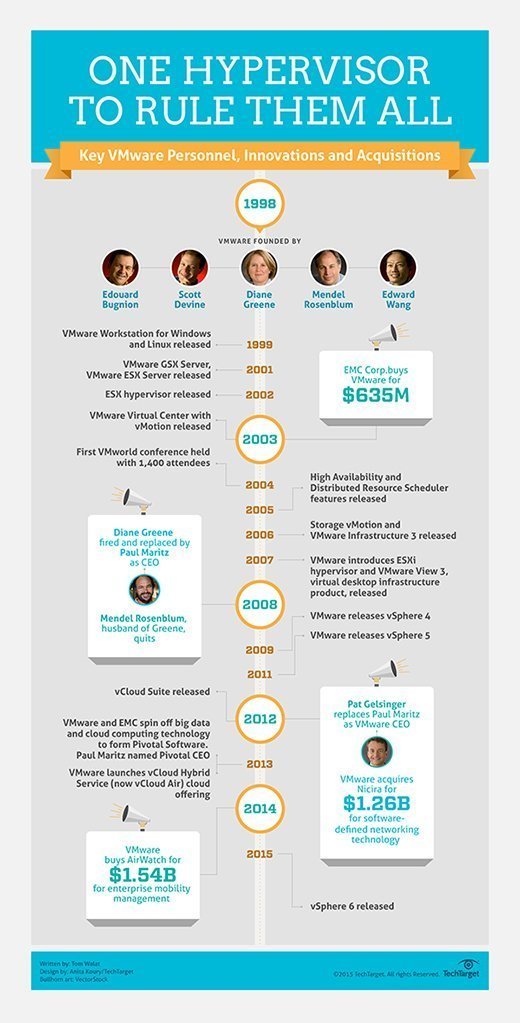
Ensure VMware third-party support with the vendor's APIs
Admins can ensure third-party tools are VMware-compatible through the SDK and API Support program, which offers APIs that integrate third-party products with VMware environments.
IT administrators can use VMware's open API and integration policy to determine whether third-party tools are compatible with VMware products. It's also important to be upfront with VMware sales representatives about any third-party tools the IT department will use.
As more organizations implement and deploy VMware products in their data centers, some admins worry their third-party tools might become obsolete. But this does not mean admins should completely disregard third-party alternatives; they should take advantage of VMware's SDK and API Support program to ensure their tools maintain VMware third-party support.
Understand how VMware's acquisition history affects third-party tools
Many of VMware's past acquisitions aimed to bolster existing products or bring new products under the VMware umbrella. VMware has always taken a careful approach when acquiring companies and new products, which is ideal for new and existing customers. But rebranding products and vendors can cause confusion.
When exploring whether admins' third-party tools integrate with VMware, the vendor's representatives often recommend replacing non-VMware and Dell Technologies products for ones under the VMware umbrella. Admins might experience some issues when it comes to Dell. Dell products don't always integrate seamlessly with VMware. Rather, Dell's products function more as third-party tools when used with VMware products. But this shouldn't deter admins from using third-party tools in their data center.

Though vendors under VMware ownership enjoy seamless product integration, VMware has an open API and integration policy -- the VMware SDK and API Support program -- which offers sanity checks, recommendations and best practices from VMware professionals.
This isn't likely to change because VMware is, in part, a public company. This ensures admins' third-party tools won't suddenly find themselves cut off from API access and functions.
If admins' third-party tools get acquired by VMware, it's harder for VMware to pass off support responsibilities. For example, if admins experience an issue using a third-party product under VMware ownership, it's harder for VMware to deny diagnostic support.
VMware support staff often have direct access to the support resources of companies it owns, which means admins receive improved response times. But VMware's acquisition of third-party tools can have a downside.
For instance, VMware might acquire a suite of products from a third-party vendor. But if a specific tool within that product suite mirrors the capabilities of an existing VMware product, VMware is likely to discontinue that third-party tool.
This is the worst-case scenario for most admins because it means replacing their preferred tool and possibly accruing additional licensing costs. If VMware purchases admins' third-party tools, the best admins can hope for is the third-party tool getting sold off, similar to when Dell purchased Quest Software and sold it in favor of VMware's monitoring products.
Unfortunately, acquisitions are unavoidable. Flexibility is an admin's greatest ally because vendor lock-in is possible. If admins' third-party tools change ownership, they must be straightforward with sales representatives about their concerns and questions. Admins should discuss renewal contracts and express concerns about multiyear deals to ensure they favor admins' interests.








